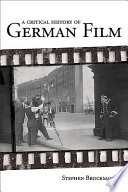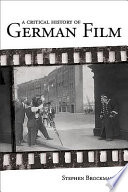- Expression
- Κείμενο
- Αγγλικά
- 2010
-
-
⟶ WorldCatAcknowledgments Introduction: Critical Film History and German StudiesEarly German Film History 1895-1918: Historical Overview Der Student von Prag (1913) and Learning to Look Weimar Cinema 1919-1933: Historical OverviewDas Cabinet des Dr. Caligari (1920) or Film as Hypnosis Der letzte Mann (1924) or Learning to Move Metropolis (1927) or Technology and Sex Der blaue Engel (1927) and Learning to Talk M (1931) or Sound and Terror Nazi Cinema 1933-1945: Historical Overview Triumph des Willens: (1935): Documentary and Propaganda Die große Liebe (1942) or Love and War German Cinema at the Zero Hour 1945-1949: Historical Overview Die Mörder sind unter uns: (1946): The Rubble Film Postwar East German Cinema 1949-1989: Historical Overview Sonnensucher (1958) or Searching for the Socialist Sun Spur der Steine (1966) or Traces of Repression Die Legende von Paul und Paula (1966) or East Germany in the '70s Solo Sunny (1980) or Even Socialism Can't Stave Off Loneliness Postwar West German Cinema 1949-1989: Historical Overview Die Brücke (1959): Film and War Der junge Törless (1966) or Recapturing Tradition Aguirre, der Zorn Gottes (1972): Film and the Sublime Deutschland im Herbst (1978) or Film and Politics Die Ehe der Maria Braun (1979) or West Germany Rebuilds Die Blechtrommel (1979) or Coming to Terms with the Nazi Past Die bleierne Zeit (1981): Film and Terrorism Der Himmel über Berlin (1987): Berlin, City of Angels German Film after Reunification 1990-2010: Historical Overview Der bewegte Mann (1994) or West German Self-Absorption Rossini (1994) or West German Self-Absorption Criticized Lola rennt (1998) or Cool Germania Good Bye Lenin! (2003) or Farewell to the Socialist Motherland Gegen die Wand (2004) or Germany Goes Multicultural Das Leben der anderen (2006) or the Power of Art Index
-
-
-
A history of German film dealing with individual films as works of art has long been needed. Existing histories tend to treat cinema as an economic rather than an aesthetic phenomenon; earlier surveys that do engage with individual films do not include films of recent decades. This book treats representative films from the beginnings of German film to the present. Providing historical context through an introduction and interchapters preceding the treatments of each era's films, the volume is suitable for semester- or year-long survey courses and for anyone with an interest in German cinema. The films: The Student of Prague - The Cabinet of Dr. Caligari - The Last Laugh - Metropolis - The Blue Angel - M - Triumph of the Will - The Great Love - The Murderers Are among Us - Sun Seekers - Trace of Stones - The Legend of Paul and Paula - Solo Sunny - The Bridge - Young T rless - Aguirre, The Wrath of God - Germany in Autumn - The Marriage of Maria Braun - The Tin Drum - Marianne and Juliane - Wings of Desire - Maybe, Maybe Not - Rossini - Run Lola Run - Good Bye Lenin - Head On - The Lives of Others Stephen Brockmann is Professor of German at Carnegie Mellon University and past President of the German Studies Assocation.
⟶ Google Books
-



